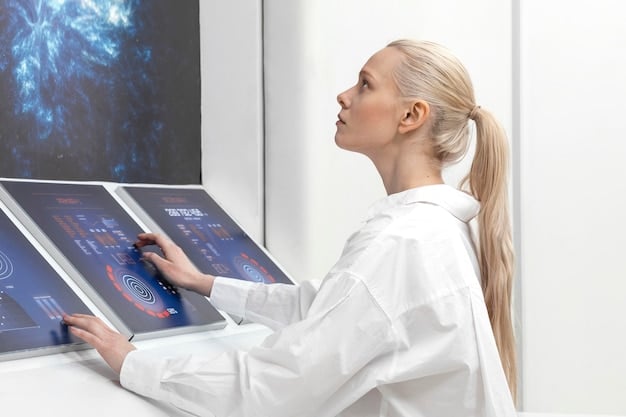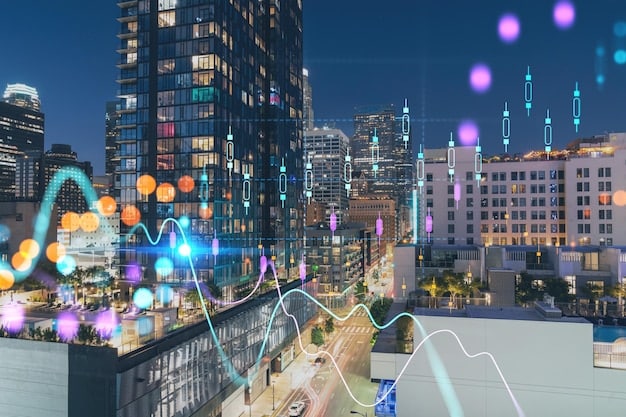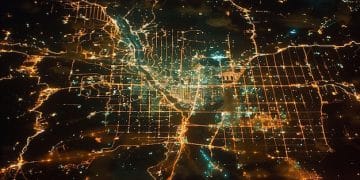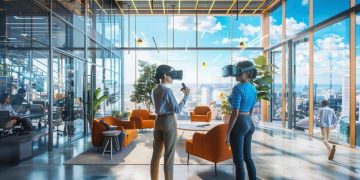Unveiling the Future: Tech Innovations Set to Reshape 2025

Unveiling the technological advancements anticipated for 2025 involves examining innovations in AI, sustainable tech, and IoT, forecasting their transformative impact on industries and daily life, thus enhancing efficiency and connectivity.
Unveiling the potential technological landscape of 2025 promises a wave of groundbreaking innovations. From artificial intelligence redefining industries to sustainable technologies addressing environmental challenges and the vast expansion of the Internet of Things (IoT) reshaping our daily lives, the coming year is set to be transformative. Let’s explore the key trends and advancements that will shape the future.
Artificial Intelligence: Revolutionizing Industries
Artificial intelligence (AI) is no longer a futuristic concept confined to science fiction; it’s rapidly becoming an integral part of numerous industries. In 2025, we can expect AI to further revolutionize sectors ranging from healthcare to finance, manufacturing to transportation.
AI in Healthcare
The healthcare industry is poised to benefit significantly from AI advancements. Imagine AI-powered diagnostic tools that can detect diseases at earlier stages with greater accuracy.
AI in Finance
The financial sector is already leveraging AI for fraud detection, algorithmic trading, and personalized financial advice. In 2025, AI will likely become even more sophisticated in these areas.
- Improved fraud detection through advanced machine learning algorithms
- AI-driven personalized banking experiences for customers
- Greater efficiency in risk management and compliance

AI is set to transform how industries function, making operations more efficient, accurate, and customer-centric. As AI technologies continue to mature, their impact will only increase, driving innovation and creating new opportunities across various fields.
Sustainable Technologies: Addressing Environmental Challenges
With growing concerns about climate change and environmental degradation, sustainable technologies are gaining prominence. In 2025, we can expect significant advancements in renewable energy, eco-friendly materials, and waste management solutions.
Renewable Energy Innovations
Solar energy is becoming more efficient and affordable. Technological advancements such as perovskite solar cells and improved energy storage systems are making solar power a more viable option.
Eco-Friendly Materials
Traditional materials like plastics and concrete have a significant environmental impact. In 2025, we’ll likely see a greater adoption of eco-friendly alternatives, such as bioplastics and sustainable construction materials.
- Increased use of bioplastics derived from renewable resources
- Development of carbon-neutral construction materials
- Advancements in biodegradable packaging solutions
Sustainable technologies are crucial for mitigating environmental impact and building a more resilient future. Innovation in renewable energy, eco-friendly materials, and other green solutions will play a pivotal role in creating a sustainable world for future generations.
Internet of Things (IoT): Connecting the World
The Internet of Things (IoT) connects everyday devices to the internet, enabling them to communicate and share data. In 2025, the IoT ecosystem will continue to expand, connecting billions of devices and transforming how we interact with our environment.
Smart Homes and Cities
Smart homes are becoming increasingly popular, and this trend is expected to continue. IoT devices can automate tasks, improve energy efficiency, and enhance security in residential environments.
Industrial IoT (IIoT)
The Industrial Internet of Things (IIoT) is transforming manufacturing and other industrial sectors. By connecting machines, sensors, and software systems, IIoT enables real-time monitoring, predictive maintenance, and optimized operations.
- Real-time monitoring of equipment performance
- Predictive maintenance to reduce downtime
- Optimized supply chain management through IoT sensors

The expansion of IoT promises to create smarter, more connected, and more efficient environments. As IoT technologies mature and become more integrated into our lives, their impact will continue to grow, leading to innovative solutions in various sectors.
The Impact of 5G and Enhanced Connectivity
The rollout of 5G networks and the advancement of wireless technologies are paving the way for enhanced connectivity. In 2025, we can expect faster internet speeds, lower latency, and more reliable connections, enabling new possibilities in various fields.
Enhanced Mobile Experiences
With 5G, mobile users will enjoy lightning-fast download speeds, seamless streaming, and immersive augmented reality (AR) experiences. This will transform how we consume content and interact with digital platforms.
Remote Work and Collaboration
Enhanced connectivity will facilitate remote work and collaboration, enabling teams to work together more effectively from different locations. This will lead to increased flexibility, productivity, and work-life balance.
- Seamless video conferencing and remote collaboration tools
- Access to cloud-based resources and applications from anywhere
- Enhanced cybersecurity measures for remote work environments
5G and enhanced connectivity are essential for realizing the full potential of various technologies. Faster internet speeds, lower latency, and more reliable connections will drive innovation and create new opportunities in numerous fields.
Cybersecurity Challenges and Solutions
As technology advances, so do cybersecurity threats. In 2025, cybersecurity will be a paramount concern, with new challenges emerging as cybercriminals become more sophisticated.
Evolving Cyber Threats
Ransomware attacks are becoming more frequent and severe, targeting businesses, governments, and critical infrastructure. AI-powered cyberattacks and phishing scams are also on the rise.
Advanced Security Solutions
To combat evolving cyber threats, organizations are investing in advanced security solutions such as AI-driven threat detection, blockchain-based security systems, and quantum-resistant encryption.
- AI-powered threat detection systems that can identify and neutralize cyber threats in real-time
- Blockchain-based security solutions for secure data storage and transfer
- Quantum-resistant encryption to protect data from future quantum computing attacks
Addressing these cybersecurity challenges is crucial for maintaining trust and security in the digital age. Proactive measures, advanced security solutions, and collaboration between government and industry are essential for safeguarding digital assets and critical infrastructure.
The Role of Augmented and Virtual Reality
Augmented reality (AR) and virtual reality (VR) technologies are transforming how we interact with the digital world. In 2025, AR and VR will find new applications in various industries, enhancing experiences and creating immersive environments.
AR in Retail and E-Commerce
In the retail sector, AR is enhancing the shopping experience by allowing customers to virtually try on clothes, visualize furniture in their homes, and access product information through their smartphones.
VR in Training and Education
VR is transforming training and education by providing immersive, hands-on learning experiences. VR simulations can recreate real-world scenarios, allowing students and professionals to practice skills in a safe and controlled environment.
- VR simulations for medical training and surgical procedures
- AR applications for interactive learning experiences in classrooms
- VR-based safety training for industrial workers
The potential of AR and VR is vast, and their integration into various aspects of our lives will continue to grow. Immersive experiences, enhanced productivity, and new entertainment options will shape the future of technology.
| Key Point | Brief Description |
|---|---|
| 🤖 AI Revolution | AI transforming healthcare, finance, and manufacturing with advanced tools. |
| 🌿 Sustainable Tech | Eco-friendly materials and renewable energy innovations combating climate change. |
| 🌐 IoT Expansion | IoT connecting billions of devices, creating smart homes and revolutionizing industries. |
| 🔒 Cybersecurity | Advanced solutions addressing evolving cyber threats, including AI-powered attacks. |
FAQ
▼
AI is expected to automate many routine tasks, potentially leading to job displacement in some sectors. However, it will also create new job opportunities in AI development, data science, and related fields, requiring workforce adaptation.
▼
Advancements in renewable energy sources like solar and wind power, along with the adoption of eco-friendly materials and waste management solutions, will significantly reduce reliance on fossil fuels, thus lowering carbon emissions.
▼
IoT applications include smart traffic management, optimized energy consumption in buildings, enhanced public safety through surveillance, and improved waste management systems, all contributing to making urban living more efficient and sustainable.
▼
Individuals can enhance their cybersecurity by using strong, unique passwords, enabling multi-factor authentication, keeping software updated, being cautious of phishing attempts, and using reputable antivirus software to protect their devices and data.
▼
Ethical considerations include privacy concerns related to data collection, the potential for social isolation due to excessive use, the risk of creating biased or misleading content, and the need to ensure accessibility for people with disabilities.
Conclusion
Unveiling the future of technology in 2025 reveals a landscape shaped by AI, sustainable solutions, expansive IoT, enhanced connectivity, cybersecurity advancements, and immersive AR/VR experiences. These innovations promise to transform industries and daily life, presenting both exciting opportunities and challenges that require proactive and thoughtful approaches for a better, connected, and sustainable world.





